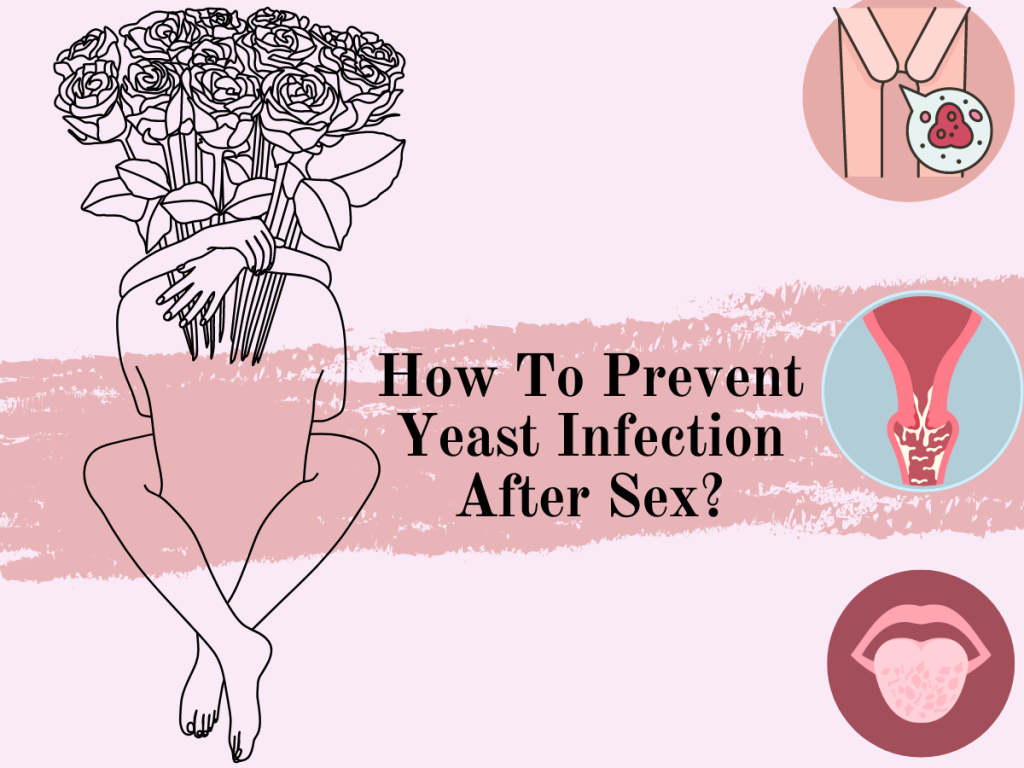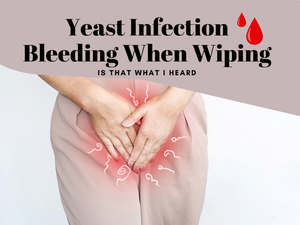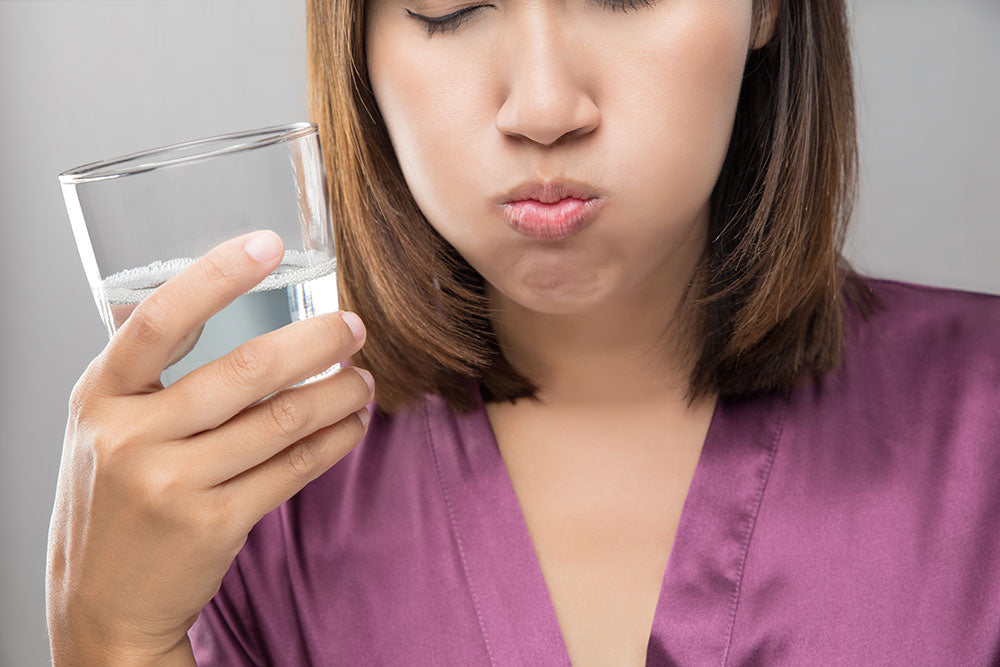Yeast infections can be oral, vaginal, and penile (Balanitis). They can spread from one partner to another in many ways, including sex, even though yeast infections are not an STI. Due to the anatomical differences, these infections most frequently occur in women and are known as vulvovaginal candidiasis. However, sexual activities such as fellatio, cunnilingus, and anilingus can result in oral thrush in both men and women and balanitis, most commonly in uncircumcised men.
Thus, it’s clear that unhygienic practices and unprotected sex can give you Candida infections from your partner. But the question is how to prevent yeast infection after sex. A brief answer to this query is CARE and HYGIENE. Yes, with prevention tips and protection, you can avoid these yeast infections and enjoy sex with your partner without worries. So dig in and find out the multiple ways you can adopt to prevent post-sex infections. Also, discover how yeast infections can disturb your sexual life and how to manage such problems.

Can You Get A Yeast Infection From Sex?
Though a yeast infection is not a sexually transmitted infection like chlamydia or gonorrhea, you can still get it after sex from your partner. But how? Remember that the human body is home to microbes. But the proportion of such microbiota is high in certain body parts such as the mouth, vulva, vagina, uterus, nipples, penis, and testicles. Therefore, touching, kissing, licking, and sucking your partner’s body parts can give you more Candida (which you already have on your body). Such higher than normal balance of candida may become opportunistic or pathogenic if;
- Your immune system is weak.
- You do not practice hygiene.
- You are on an antibiotic or hormonal treatment.
- You are uncircumcised.
- You are pregnant.
- You are using birth control pills.
- You don’t wear breathable undergarments after sex.
- You have diabetes.
- You have HIV, or you are on chemotherapy.
Rapidly proliferating candida then ultimately becomes an infection that can affect the mouth (oral thrush), vagina (vaginal thrush), or penis (balanitis). So it’s true that you can get a yeast infection from sex unless you are not healthy and clean. Nevertheless, you can avoid this problem by following the below-mentioned prevention tips. Before it, know what happens when you have sex with a yeast infection.
How To Prevent Yeast Infection After Sex?
It is as easy to prevent as to get a yeast infection after sex. Since sexual activity involves moisture, warmth, exchange of fluids, and transfer of microbes from one body to another, it creates a beneficial environment for Candida to overgrow indefinitely. Therefore, to prevent such infections, you must learn to avoid creating a yeast-friendly atmosphere in your intimate body parts. Typical prevention tips involve pre and post-sex hygiene and material cleanliness (such as bed, bedsheets, undergarments, sex toys, and contraceptive devices.
The 5 Essential Do’s After Sex
1. Urinate After Sex
You might have heard to urinate after sex. Have you thought about it before? Why? Because urine can flush out most bacteria and candida that thrive or have entered the vagina or penis during sex. So make it a habit and pee after sex to prevent yeast infections.
2. Wipe After Sex
Sexual arousal is always accompanied by arousal fluids which means a lot of heat and moisture and, of course, a good home for candida overgrowth. So wipe your private parts after sex with cotton, unscented tissue, or a towel. It’s best to wash the area after 5-7 minutes with plain water and then wipe it to dry. Men with foreskin should pull it back gently and wash it underneath thoroughly.
3. Wash Your Hands
Wash your hands after sex to wash off bacteria and fungi you might get from touching your partner’s genitalia. It’s an essential step to will help prevent the spread of infections.
Keep Yourself Hydrated
Drink a glass of water to keep your body temperature optimal. It will also help hydrate your body and filter unwanted foreign objects through urination.
Let It Breathe
Let it breathe means let your vagina or penis breathe. Do not wear underwear immediately after sex. Always wear loose-fitting clothes to avoid creating any humid and warm environment that may trigger candida to multiply and cause you a yeast infection.
The Don’ts
- Do not use toxic chemicals and fragrances in the name of feminine hygiene products.
- Do not douche and use hot tubs frequently since they can disrupt normal microflora.
- Do not wear undergarments right after sex.
- Do not wear wet to damp clothes.
- Do not intake too much sugar.
- Do not wear tight leggings or pants.
- Do not use filthy sex toys; always wash them after use.
Care After Oral Sex
Oral sex can also frequently cause oral thrush, vaginal thrush, and balanitis due to the exchange of microbes from the intimate parts as well as from the tongue and gums between you and your partner. However, using dental dams and condoms can prevent such microbial transfer. Also, sexual partners should practice good oral hygiene, regular brushing, and gargling with antiseptic mouthwashes.
Care After Anal Sex
Anus is a delicate part of the body; unlike the vagina, the anal lining is thin and fragile. So it’s possible that it may get micro tears after anal sex. Introducing the foreign body (penis or sex toys) exposes more bacteria and Candida into the anus, which may reside in the micro tears and cracks, leading to terrible infections. Therefore, it’s best to wash the area thoroughly with plain warm water or mild unscented soap to avoid such horrible consequences. You can also practice anal sex in the shower to prevent mess.
Your Clean-Up Kit
For proper and convenient cleansing after sex, you can keep a post-sex clean-up kit in your bedroom. Supplies you may require:
- Pure cotton, washed and dried towels
- Unscented and chemical-free wipes
- Mattress protectors or liners
- Mild soaps
- Personal water-based lubricants
- Dental dams, condoms, or other contraceptive devices
- Washcloths to clean up your IUDs or sex toys
- Water bottle
- OTC antifungal topical creams or ointments
- Anti-itch body lotions
What Happens When You Have Sex With A Yeast Infection?
Yeast infection not only makes sex painful for your partner but also makes it more likely that they will contract the infection from you.
In Women:
When you have a vaginal yeast infection, your labia and vagina are swollen, irritated, and inflamed. During sex or foreplay, your skin-to-skin contact with your partner appears rough and dry. Extreme friction may even cause the skin to rub raw, and penetration may rupture the inner inflamed lining of the vagina, ultimately leading to bleeding/spotting. The whole experience may enormously increase irritation and itching of the genitalia. In a nutshell, sex becomes painful and highly uncomfortable. You and your partner may not be satisfied with the experience, which can disturb your sexual life; if prolonged.
In Men:
Yeast infection in men, known as balanitis, makes the penis inflamed, itchy, discolored, or patchy, with excess white itchy discharge from the foreskin. In some patients, sores or lesions may also appear on the head of the penis, which is quite an uncomfortable and troublesome condition. So when a man is already poorly infected and has sex with a partner, the friction involved and the secretions can severely aggravate the symptoms of his infections. The irritated penis can also quickly transfer the infection to his sexual partner. Therefore, an infected person should avoid sex when infected with Candida.
Failure Of Barrier Contraception:
Many people rely on essential oils to treat yeast infections topically; such oils may break condoms, which is a massive problem if you rely on a barrier method for contraception.
Outlook
This insightful description clearly says you can get a yeast infection from sex if your partner is infected and you don’t follow the post-sex prevention tips. If you don’t know about after-sex care and hygiene, read this blog and get all answers to your queries. Remember that yeast infection is not an STI and a major concern; you can clear up the infection quickly following OTC antifungal treatment that can be topical or oral, depending on the severity of the infection. However, prevention is better than cure, so always practice good hygiene and cleanliness.













